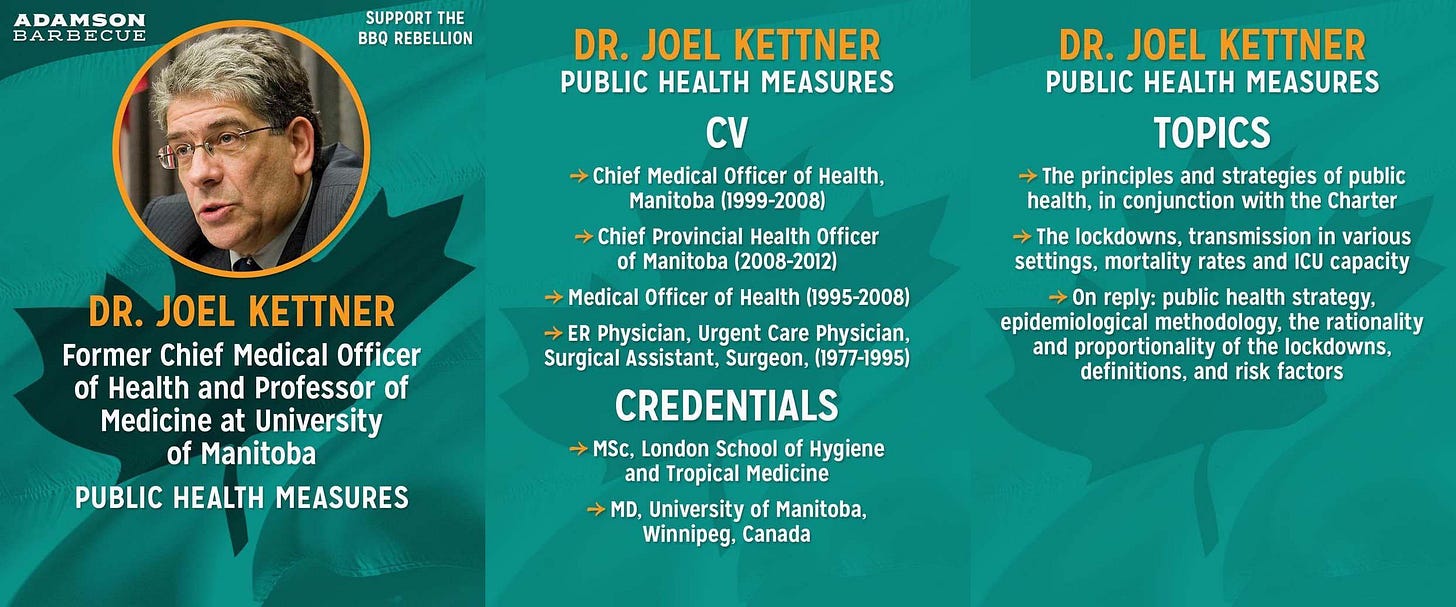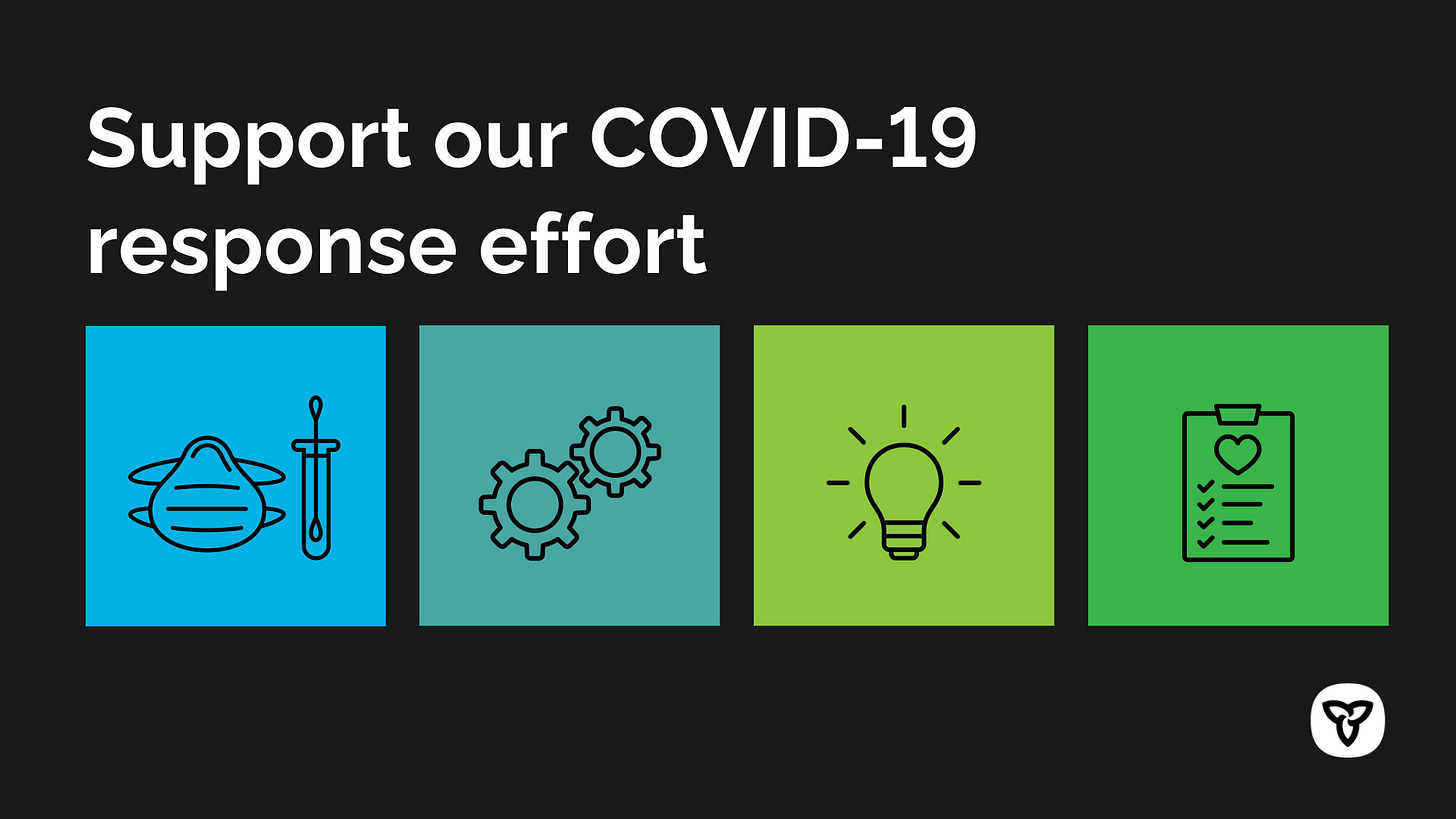Stick A Fork In It: Principles of Public Health
TL;DR - The official response to covid abandoned emergency preparedness plans and ignored lessons learned from past outbreaks
In April 2021, Dr. Joel Kettner, former Chief Medical Officer of Health for Manitoba and professor at University of Manitoba, was called upon as an expert witness to discuss the principles and strategies of public health in support of the Barbecue Rebellion constitutional challenge. In his affidavit submitted to the Ontario Superior Court, he reminded Canadians that “in a public health emergency, the advice from public health professionals is expected to be based on valid and reliable data, relevant information, objective scientific evidence, and critical reasoning.”
Remember the initial “two weeks to flatten the curve,” which was the precursor for extended lockdowns? Can you recall what reliable data and objective evidence informed that approach? No, you can’t, because there was none. Lockdowns were a knee-jerk reaction that gained traction due to two primary factors:
A speculative epidemiological model by Neil Ferguson et al, which was hastily given credence by the World Health Organization (WHO) and international media despite Ferguson’s abysmal track record modelling the 2005 bird flu and 2009 swine flu outbreaks, among others.
A visit to China by Dr. Clifford Lane of the National Institute of Health (NIH), who reported being “very impressed” with the country’s ruthless restrictions despite their “great cost.” His claim was bolstered by a sophisticated propaganda campaign out of China, which used social media to push unsubstantiated claims of “success” in containing the virus, popularizing lockdowns in the susceptible minds of a frightened public.
Prompted by conjecture, hearsay, and misinformation, the profession tasked to think and act on verifiable fact – public health – succumbed to peer pressure, circumvented peer review, and blindly followed the leads of a disgraced forecaster and a notoriously opaque nation. Unfortunately, this was merely their first failure on what proved to be a very slippery slope.
“We have heard from federal, state, and even local officials that Chinese diplomats are aggressively urging support for China’s handling of the COVID-19 crisis. Yes, this is happening at both the federal and state levels… We had a state senator who was recently even asked to introduce a resolution supporting China’s response to the pandemic.”
– Christopher Wray, Director of the Federal Bureau of Investigation (FBI). July 7, 2020.
Continuing with Dr. Kettner’s testimony, he explained that “decisions must consider short-term and long-term benefits and harms for society as a whole. These considerations must include all matters pertaining to health. Even when one specific disease becomes the focus of attention, decision-makers and advisors must consider… the causes and risk factors of all diseases and injuries. These factors are often referred to as determinants of health.” Past pandemic plans understood these concepts and accounted for them. In fact, according to Health Canada’s Pandemic Influenza Preparedness Guidance for the Health Sector from December 2018, lessons learned from the 2009 H1N1 pandemic include:
“The public health benefits of any given measure must be weighed against the economic and social costs of its implementation.”
“The rationales for implementing them must be clear and consistently communicated to the public and updated as the situation evolves.”
“Widespread restrictions of movement to contain or slow an emerging pandemic are impractical, if not impossible, to implement.”
“International border entry screening is ineffective… at best it can delay epidemics by only a few weeks.”
Retired Lieutenant Colonel David Redman, a 27-year veteran who wrote Alberta’s 2005 pandemic preparedness influenza response plan and was the former head of the Alberta Emergency Management Agency, tried diligently to remind Canada’s leaders of these and other lessons. In a January 2021 interview, he said “governments took every emergency pandemic plan they’d ever written and threw them out the window when COVID arrived.” In another interview, in February 2023, he explained that the failure of elected officials to use the plans should make them guilty of “incompetence because they did not do their due diligence.” Throughout covid, he wrote letters to all provincial premiers advising them how and why their approach was misguided and urging them to change course, but he only received automatic replies and was never brought in for consultation.
His input would have been especially valuable because he understood how all areas of society are impacted by emergency restrictions, having factored feedback from all sectors – not just healthcare – into the pandemic plans. As such, he further criticized premiers for deferring to medical doctors, not provincial emergency management offices, for final say on decision-making. Why not defer to doctors? Because it’s like asking soldiers in the trenches how the war is going. Doctors, like soldiers, play a vital role and have a valuable skillset, but they are purpose-specific, and lack the perspective, preparation, and experience, to address critical issues affecting the needs of society at large.
Thinking back on the heavy-handed restrictions throughout covid, was public health’s narrow obsession with avoiding the virus truly in everyone’s best interests? Were any alternative strategies considered, especially ones that would have been less damaging and accounted for all determinants of health? Were measures proportional to risk? Was public health messaging consistent and logical? When new evidence emerged, was it clearly communicated to the public and were measures updated accordingly? Were lessons of past pandemics factored into decision-making? Regrettably, the answer to all these questions is a resounding ‘no.’
“Lockdown was never part of our planned pandemic response, nor is it supported by strong science… Our well-intentioned but misguided efforts to control Covid are only compounding the tragedy. We need to change course. No one has all the answers, but the first step is asking the right questions.”
– Dr. Richard Schabas, Former Chief Medical Officer of Health of Ontario. January 18, 2021.
This post is part of an article called Stick A Fork In It: The Barbecue Rebellion & The Rude Awakening, which is available in its entirety on my Substack:





